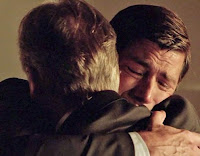It has been translated into more
than 200 languages and is second only to the Bible in the number of copies sold
worldwide. Wikipedia calls it “one of the most significant works of religious
English literature, and has never been out of print. It has also been cited as
the first novel written in English.”
No, this is not a work by
Shakespeare. It is John Bunyan’s 1678 Christian allegory Pilgrim’s Progress. It’s more complete title is The Pilgrim's Progress from This World, to
That Which Is to Come. (Its original title would fill half this page!)
But the chances are you have
never read it. In recent decades it has fallen out of fashion, even among
devout Christians. I first read it when I was 18, when I spent a summer reading
all the classics that my formal education did not see fit to assign me. That
was the summer I also read Dante, Homer and Milton.
I fell in love with Pilgrim’s Progress again when I visited the
John Bunyan Museum and Library in
Bedford, while on sabbatical in England. It prompted me to read his other works
and lead discussion groups on Pilgrim’s
Progress in my church.
I have often wondered what Bunyan
would have written if he were alive today. That led me to my most recent
writing project, entitled The Seeker’s
Journey, subtitled A Contemporary
Retelling of Pilgrim’s Progress.
This is not your grandfather’s
Pilgrim’s Progress! In my retelling of the beloved allegory, Seeker (who later
changes his name to Pilgrim) meets Campus Crusader on his university campus.
The evangelist instructs him to begin his journey by entering through a gate
illuminated by a lamppost, which strangely resembles the one at the boundary of
Narnia.
Instead of the Slough of Despond
this modern Pilgrim falls into the Bog of Existential Angst, and then stays in
the Town of Therapy for a while. Where Vanity Fair used to be, now there is
Prosperity Gospel Ministries. Pilgrim visits the City of Megachurch where he
meets people who suspiciously resemble Robert Schuller, Joel Osteen, Rick
Warren, and Benny Hinn.
The allegorical characters are
still here, but their names are more familiar to modern ears. There is
Judgmental, Bored, and Spiritual But Not Religious. Pilgrim meets Tolerant and
Intolerant, Psychologist, Evangelical, and the Dark Knight of the Soul. Calvin
and Arminius live in a cave overlooking the Valley of Dry Bones. Billy Graham
and the Dalai Lama make cameo appearances.
In the Theologian’s House he
encounters many interpretations of the Bible and Christ, all of which are
recognizable from the American religious landscape – from Creationism to
Feminism. Pilgrim visits First Baptist Church where he stays at the home of a
Fundamentalist family. He fights the dreaded Apollyon, travels through the
Valley of the Shadow of Death, and encounters the Four Horsemen of the New
Atheism.
These are just a few of the
adventures that Pilgrim and his companions have on their journey from their
home in the Shadowlands (shades of C. S. Lewis) to their Destination beyond the
river. Along the way there are references to Harry Potter, Philip K. Dick,
Talladega Nights, and Mark Twain. The ending will surprise you.
The Seeker’s Journey: A Contemporary Retelling of Pilgrim’s Progress
is a humorous romp through the landscape of 21st century American Christianity,
which I hope will get you thinking and laughing. It is available in both Kindle and paperback. I hope you enjoy it. I certainly enjoyed writing it.





